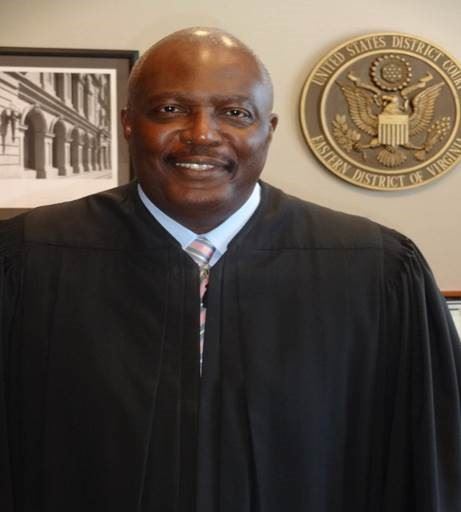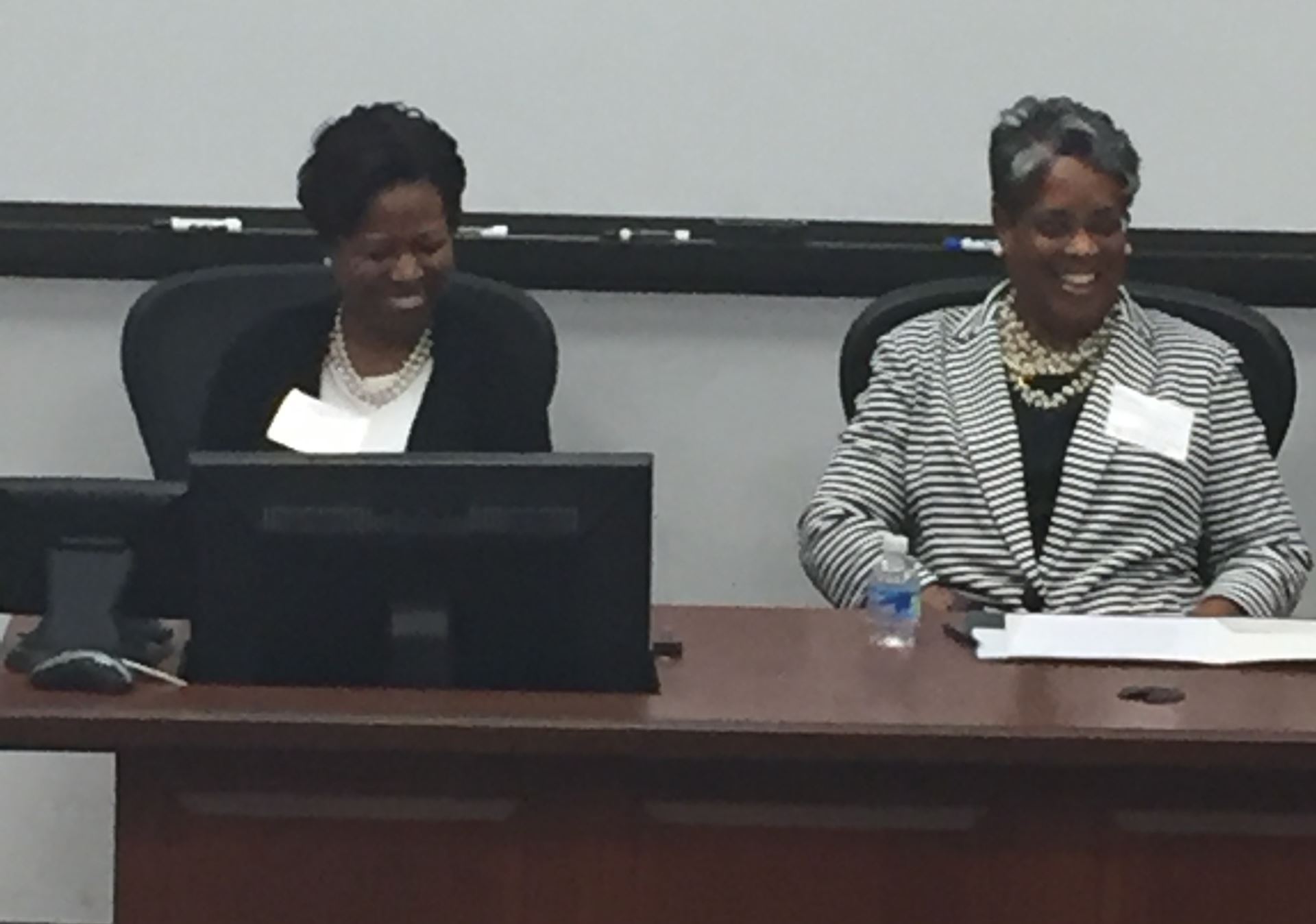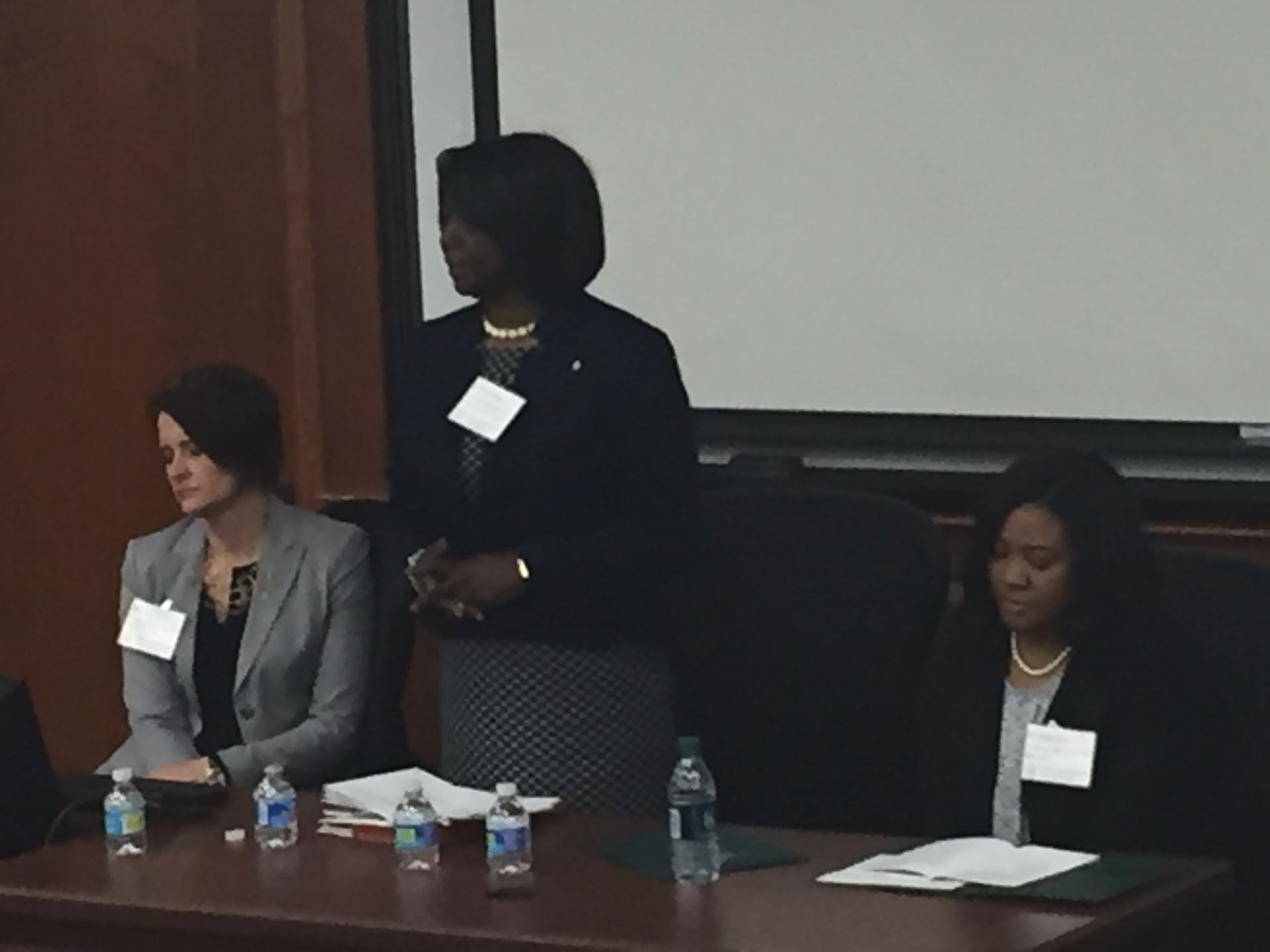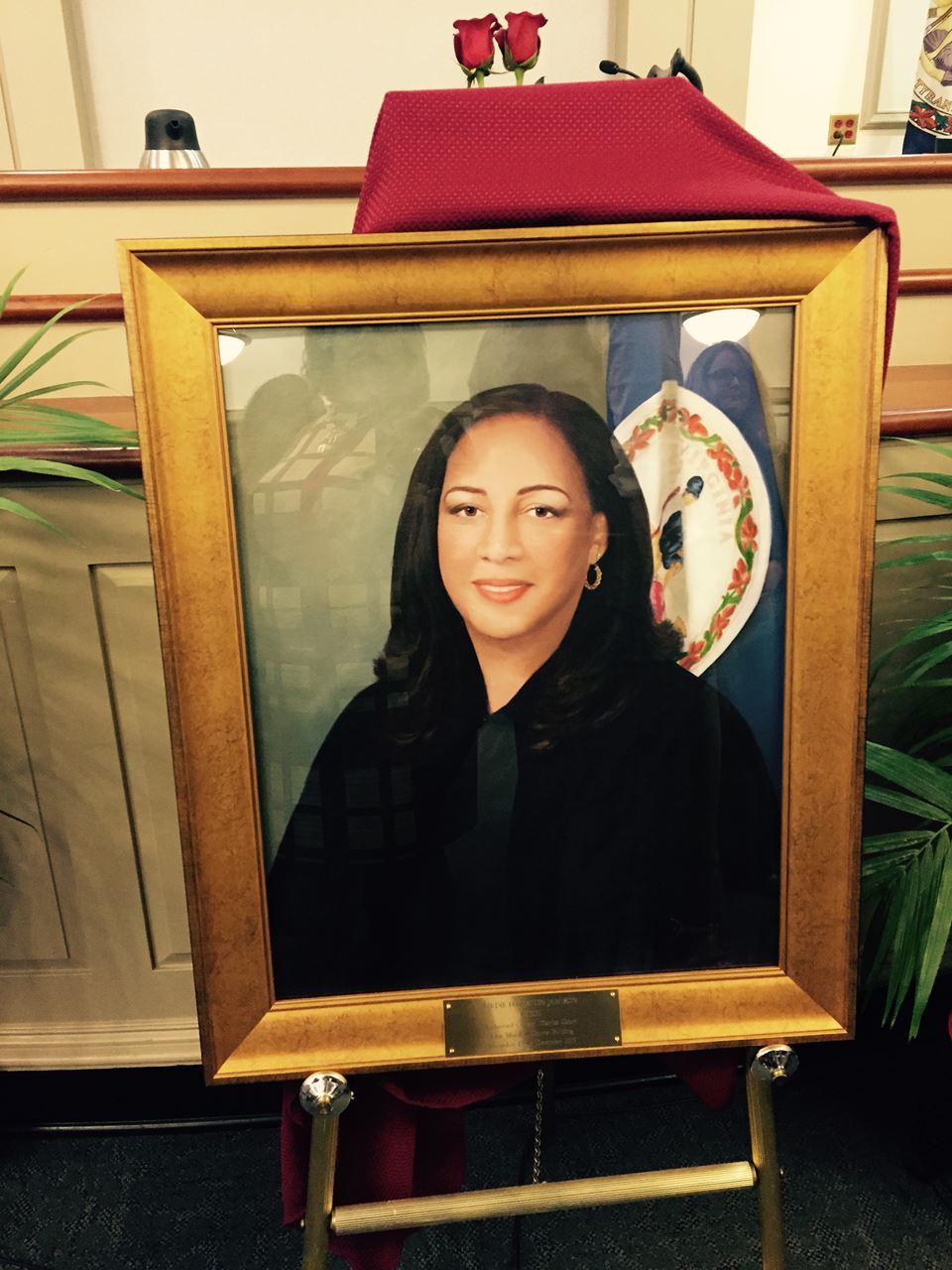.jpg) Old Dominion Bar Association
Old Dominion Bar Association
Photos from the investiture of Judge Doris Elcenia Henderson Causey held April 6, 2023 in Richmond, Virginia.
Honorable James R. Spencer (Ret.) Joins The McCammon Group
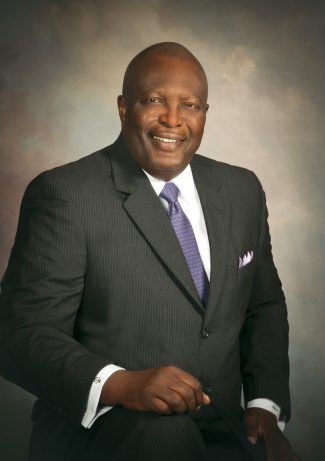 The Honorable James R. Spencer (Ret.) has joined The McCammon Group, a leading provider of alternative dispute resolution (ADR) services in the mid-Atlantic region.
The Honorable James R. Spencer (Ret.) has joined The McCammon Group, a leading provider of alternative dispute resolution (ADR) services in the mid-Atlantic region.
Judge Spencer recently retired after over thirty years of dedicated service as a Judge for the U.S. District Court for the Eastern District of Virginia, including several years as Chief Judge. Judge Spencer began his legal career as a Captain in the U.S. Army JAG Corps and as an attorney with the Atlanta Legal Aid Society. He then went on to serve as a U.S. Attorney for the District of Columbia, where he was a member of the elite Major Crimes Division. Judge Spencer later joined the U.S. Attorney’s office in the Eastern District of Virginia, until he was appointed as the first African-American U.S. District Court Judge in the Commonwealth of Virginia. Judge Spencer now brings this exceptional record of service and accomplishment to The McCammon Group to serve the mediation, arbitration, judge pro tempore, and special master needs of lawyers and litigants throughout the Commonwealth and beyond.
Since 1995 The McCammon Group has provided ADR services including mediation, arbitration, special master, and judge pro tempore. It consists of eighty-two Neutrals including retired judges and practicing attorneys located throughout Washington, D.C., Maryland, and Virginia. Importantly, throughout this time The McCammon Group has achieved a settlement rate of approximately 85% in its mediation work. The McCammon Group is committed to the proposition that ADR processes provide individuals, as well as public and private entities, with many substantial benefits including effective and prompt resolution of disputes, self-determination, cost savings, timeliness, flexibility, and confidentiality.
For more information, please visit www.McCammonGroup.com
Honorable Gerald Bruce Lee (Ret.) Joins The McCammon Group
.jpg) The Honorable Gerald Bruce Lee (Ret.) has joined The McCammon Group, a leading provider of alternative dispute resolution (ADR) services in the mid-Atlantic region.
The Honorable Gerald Bruce Lee (Ret.) has joined The McCammon Group, a leading provider of alternative dispute resolution (ADR) services in the mid-Atlantic region.
Judge Lee admirably served for nineteen years on the bench of the U.S. District Court for the Eastern District of Virginia. Prior to his appointment to the federal judiciary, Judge Lee served for over six years as a judge for the Fairfax Circuit Court, and before that, he was a trial lawyer representing individuals and businesses in complex civil disputes. Throughout his illustrious career, Judge Lee served his community on various boards and committees, including the Board of Directors of the Metropolitan Washington Airports Authority, as Chairman of the Virginia Judicial Conference Judicial Education Committee, and as a member of the Virginia Circuit Court Judges Benchbook Committee. Judge Lee now brings his record of excellence and achievement to The McCammon Group to serve the mediation, arbitration, special master, and judge pro tempore needs of lawyers and litigants throughout Virginia, D.C. and beyond.
Since 1995 The McCammon Group has provided ADR services including mediation, arbitration, special master, and judge pro tempore. It consists of eighty-three Neutrals including retired judges and practicing attorneys located throughout Washington, D.C., Maryland, and Virginia. Importantly, throughout this time The McCammon Group has achieved a settlement rate of approximately 85% in its mediation work. The McCammon Group is committed to the proposition that ADR processes provide individuals, as well as public and private entities, with many substantial benefits including effective and prompt resolution of disputes, self-determination, cost savings, timeliness, flexibility, and confidentiality.
For more information, please visit www.McCammonGroup.com
VIRGINIA’S FIRST BLACK FEMALE JUDGE WINS STATE HONOR
Trailblazing judge Angela Roberts, a Caroline native, honored as a "Strong Woman in Virginia History"
By ADELE UPHAUS–CONNER THE FREE LANCE–STAR
Judge Angela Roberts speaks at the Strong Women and Men in Virginia History awards ceremony in Richmond Feb. 4. Roberts, a Caroline native who was the first African-American woman to be elected to a judgeship by the General Assembly, was one of this year's nominees.
Judge Angela Roberts stands in her former courtroom at the Oliver Hill Courts Building in Richmond, Va. on March 1, 2018. Roberts was named a “Strong Woman in Virginia History” by the Library of Virginia and Dominion Energy.
Judge Angela Roberts speaks at the ‘Strong Men and Women in Virginia History’ awards ceremony in Richmond, where she was honored Feb. 4.
Angela Roberts still remembers the moment she decided she wanted to be a lawyer.
It was 1967 and she was in seventh grade in Caroline County. She was flipping through a Scholastic Weekly Reader in social studies class when she saw a picture of Patricia Harris, a black female attorney who had just been appointed ambassador to Luxembourg by President Lyndon Johnson.
That made Harris the first African-American woman to serve as an envoy of the American government.
“Seeing her picture and reading the article had a huge impact on me,” Roberts, 63, said. “It’s so important for young people to see people who look like them in positions of authority.”
From that time on, Roberts knew she wanted to be a lawyer and she never deviated from that goal.
In 1990, she made history herself when she became the first black woman to serve as a judge in Virginia. She was elected by the General Assembly to the Richmond Juvenile and Domestic Relations Court and served for 26 years, retiring in 2016.
In February, Roberts was honored by the Library of Virginia and Dominion Energy as one of seven “Strong Men and Women in Virginia History.” The program, now in its sixth year, recognizes black Virginians both past and present who have made significant contributions to the state.
“I was very excited and proud,” she said. “I’ve attended the program in the past and just sat in the back in awe of the other nominees.”
Roberts said she had a happy childhood growing up in Bowling Green. Her father, Edgar Edwards, owned a cab company and her mother, Annie, was a stay-at-home mom.
“The neighborhood was like a village—everyone looked out for everyone else’s kids,” she said.
Things got a little tougher after Roberts’s father died of cancer when she was 14. Her mother had to work outside the home for the first time. She first found a job in a school cafeteria and then at a home for delinquent girls in Hanover.
Though Roberts has largely positive memories of her childhood, she does remember that it was segregated community. Blacks and whites had completely separate social lives.
“I remember I never went to the movies in Bowling Green because blacks had to sit in the balcony and my parents refused to do that,” she said.
Schools were still segregated when she started kindergarten in 1960. They were integrated in 1968, when Roberts was in high school.
“But growing up, I never felt like I got an inferior education at all,” she said. “Caroline had built identical elementary schools, so [the black and white schools] were exactly alike. I got an excellent, nurturing education and was easily able to compete when we did integrate. It was a smooth transition.”
Roberts’s mother and much of her extended family still live in Bowling Green. She said Caroline was and still is a community where blacks are actively involved in local life and politics.
After high school, she studied political science at Virginia Tech and then attended law school at Emory University School of Law in Atlanta. She returned to Virginia to work as a prosecutor.
In 1990, Roberts said, there were many people who thought it was “beyond time” for Virginia to have a black female judge.
“They fought hard for my election,” she said. “I knew I would be the first, and when I was initially approached I thought, ‘Oh, I’m not the one.’”
She had a two-year-old son, Anthony, and thought she needed more experience. But politicians and colleagues convinced her, “and I’m very glad I listened to them,” she said.
Support from her husband and extended family helped her juggle work and motherhood.
“There’s no way I would have been able to do it without that partnership,” she said.
Serving on the Juvenile and Domestic Court bench involved difficult decisions and coming face-to-face with the “cruel things adults can do to children,” Roberts said.
“I always had a strong reaction when we had to commit a young person to the state or recommend a young person be tried as an adult,” she said. “I felt like the court had failed—could we have done more?”
On the other hand, she got to play a part in reuniting families and creating new families through adoption.
In 2002, she established a National Adoption Day celebration in Richmond, based on an idea that she joked she got from the television show “Judging Amy.”
In what has become an annual event, families come together at the court house one Saturday in November to have their adoptions finalized and celebrate all those that took place that year.
“It also helps us to publicize the need for foster care homes,” Roberts said.
She decided to retire from the bench in 2016 to spend more time with her husband, Roscoe Roberts, who is general counsel to the University of Virginia, and her two sons Anthony, 30, an MBA student at the Darden School of Business, and Justin, 25, a Navy pilot. She continues to serve as a substitute judge and is active with her sorority, Delta Sigma Theta; volunteer organization The Links; and on the board of the YMCA of Greater Richmond.
In her speech at the Strong Men and Women of Virginia awards program in Richmond Feb. 7, Roberts challenged Virginians to “stay woke,” or socially aware of issues, in today’s often-tense political and racial climate.
“I’m extremely concerned with policies and attitudes that don’t seem to understand current truths about racial relations,” she said in an interview. “Fears and prejudices today are more controlling than relationships and conversation.”
She said that overcoming these prejudices requires society to establish places where “people can interact with those who are different from themselves.”
“Education will always be the best method for attacking ignorance,” she said in her speech, addressing Virginia’s youth. “Know in your heart that what some people mean for evil, God can use for good.”
Portrait unveiled for Hampton’s first African-American judge
Congratulations to our revered ODBA member Judge Wilford Taylord, Hampton's first African-American judge!
Photos and story from dailypress.com >
A portrait of Wilford Taylor Jr., Hampton’s first African-American judge, was unveiled Friday in the Hampton Circuit Courthouse.
Taylor was appointed to General District Court in 1985 and to the Circuit Court 10 years later. He retired in December.
The Honorable Wilford Taylor Jr., Judge for the Eighth Judicial Circuit, City of Hampton, reacts to comments his daughter Patrice Shelton makes during the Portrait Presentation ceremony held in the courtroom in which the portrait will hang. (Judith Lowery / Daily Press)
At 67, Taylor retired years ahead of the mandatory retirement age of 73. His six-year term on the bench would have ended in 2019.
When Taylor retired, Chief Circuit Judge Christopher W. Hutton said, "He's probably one of the finest gentlemen I know. His strength is his uncompromising patience. As much as I'd like to keep him, I am happy he is happy."
The Honorable Wilford Taylor Jr., Judge for the Eighth Judicial Circuit, City of Hampton, checks out the portrait that will hang in the courtroom. Holding it steady is on left, his wife, Linda, and on right, the Honorable Christopher W. Hutton, Chief Judge. (Judith Lowery / Daily Press)
President Trump plans to nominate ODBA member Judge Rossie D Alston to the federal bench to take the seat of ODBA member Judge Gerald Bruce Lee who retired this fall. ODBA members continue to have a great season! Congratulations Judge Alston!
Read more at washingtonpost.com >

Judge Rossie D. Alston Jr. at the Capitol in Richmond in 2015. (Bob. A Brown/Richmond Times-Dispatch/AP)

The ODBA congratulates its Judicial Member, the Hon. Angela Roberts, for her selection as a Fellow for the Class of 2018 for the Virginia Law Foundation (VLF). The Fellows are recognized as leaders in the profession of law in their practice and communities. They comprise of a group of nearly 500 of Virginia’s “best and brightest legal practitioners, committed to the highest ideals of the Law and to the concept of citizen lawyer.” Judge Roberts has always exhibited these qualities as a dedicated member of the ODBA for decades.
Nearly 20 current and past ODBA members have received this honor since the inception of the VLF in 1974. ODBA past and current executive committee members with this distinction include Beverly A Burton (2008), Doris H. Causey (2016), Hon. Marilynn Goss (2007), Hon. Roger Gregory (1990), Helivi L. Holland (2017), Hon. Raymond Jackson (1990), W. T. Mason (1994), Joyce Melvin-Jones (2015), Hon. Margaret Spencer (Ret.) (1992).
ODBA shares many of the values of the VLF regarding a commitment to service to our communities as we practice law. We are proud of the aforementioned distinguished ODBA members and our current and past other members who have been selected for such a prestigious award.
To see the complete list of VLF Fellows that include all of ODBA distinguished members click here.
The Fairfax County Bar Association (FBA) awards the Honorable Gerald Bruce Lee, United States District Judge in the Eastern District of Virginia, the Jurisprudence AwardNov. 1, 2017 The Jurisprudence award is the highest award given by the FBA to recognize exceptional contributions to our judicial system. A singular honor, it is not presented annually, but has been awarded over years to attorneys and judges who have distinguished themselves and honored our profession in a variety of meaningful ways. Judge Lee was recognized for his substantial contributions as a judge in the Fairfax Circuit Court and on the United States District Court for the Eastern District of Virginia as well as his longstanding efforts to promote diversity in the legal profession and to inspire young people to overcome challenging circumstances. Speakers included the Honorable Rossie D. Alston, Jr. of the Court of Appeals of Virginia, the Honorable Dennis J. Smith, Retired Chief Judge of the Fairfax County Circuit Court and others who casually roasted Judge Lee. A good time was had by all. We Salute ODBA Member |
The ‘Rocket Docket’ is down a judge. It’s time to fill the vacancy. Story and photo by the Washington Post By Carl Tobias U.S. District Judge Gerald Bruce Lee (Courtesy the U.S. District Court Eastern District of Alexandria) Last Saturday, Eastern District of Virginia Judge Gerald Bruce Lee retired after 19 years of dedicated service on the court, which enjoys the well-deserved reputation as the “Rocket Docket” for its speedy resolution of civil litigation. Because the district needs all the court’s judges to discharge its constitutional responsibility to deliver justice, Virginia’s two senators, Mark Warner and Tim Kaine, both Democrats, must work cooperatively with President Trump and Rep. Bob Goodlatte, the senior Republican in the Virginia congressional delegation, to expeditiously fill Lee’s vacancy. This spring, Lee informed President Trump that he would retire on Sept. 30. The jurist has resolved thousands of cases, including numerous high-profile suits. For example, he sentenced Ahmed Omar Abu Ali to 30 years in prison for plotting to kill former president George W. Bush. He ruled that the Washington Redskins name disparages Native Americans. He also urged the U.S. Sentencing Commission to reduce mandatory-minimum sentences for crack cocaine offenses, even as he imposed stiff sentences on repeat offenders. Lee also instituted many efforts to enhance diversity in the Eastern District, which is critical to justice in the federal courts. |
On Aug. 25, Warner and Kaine announced that they were accepting applications to fill the vacancy. The senators asked an independent lawyers committee to review the applications and interview candidates. Warner and Kaine said they would then evaluate panel suggestions and recommend highly qualified individuals to Trump. Goodlatte has posted no similar announcement, but the representative did supply recommendations for the Western District of Virginia U.S. Attorney vacancy, which suggests he may tender analogous proposals for Lee’s vacancy. The senators and Goodlatte must submit multiple recommendations with reasons for their selections to Trump, so he will have flexibility to choose the best person. When the White House receives the suggestions, the Counsel’s Office should promptly analyze them, interview candidates and recommend names to the president. The White House should carefully consult the senators and Goodlatte and reach consensus soon on the strongest candidate. Once the Senate receives the nomination, Sen. Chuck Grassley (R-Iowa), the Judiciary Committee chairman, must promptly institute panel investigation, convene a hearing at which members rigorously question the nominee and conduct a discussion and vote. After panel approval, Senate Majority Leader Mitch McConnell (R-Ky.) should arrange a floor debate and vote. Lee said when announcing his retirement, “For 25 years, I’ve sent people to jail on Fridays. It’s time to do something more.” It would be fitting to promptly fill his vacancy with a nominee who is as dedicated to the law and justice as the jurist. |
Hon. Klinette Kindred Appointed Judge in Eastern District of VA |
75th Anniversary Judicial Luncheon Processional June 2015 To see practically every one of the ODBA Judicial Members proceed into the luncheon in their robes was a tremendous site. Special appreciation is expressed to The Hon. Marilynn Goss for coordinating the luncheon and The Hon. Angela Roberts for serving as the keynote speaker. If you missed the opportunity to be there or if you were there and just want to see the processional just one more time, click below: |
Regent University BLSA Black History Banquet Honors Two Judicial Members and ODBA February 20, 2015 ODBA was surprised to receive a gold sponsorship certificate at BLSA’s Making Black History Banquet on February 20, 2015, at Regent University School of Law. Several members, including Clarence Brooks, Darius Davenport, W. T. Mason, Judge Raymond Jackson, W. Marcus Scriven, Judge Alfred Bates, and others with dual membership in the Southampton Roads Bar Association, were present filling three tables. Angelina Moyo, Vice Chair of the Chapter, gave thanks for all of the assistance ODBA has given to the BLSA Chapter this year and the student/attorney/judge contacts that ODBA has facilitated. Judicial members and alumnae of the law school, Teresa Hammons and Tanya Bullock, were recognized along with the first black graduate of the law school, Dr. Joyce Marie Plummer. ODBA congratulates our Judicial Members Hammons and Bullock for their many accomplishments. |
Investiture of ODBA Member Roderick C. Young, United States Magistrate Judge
October 28, 2014 ODBA is pleased and proud to announce that the investiture ceremony for Roderick C. Young as U. S. Magistrate Judge for the Richmond Division of the Eastern District of Virginia will take place on January 16, 2015 at 3:00 pm at the Federal Court House in Richmond. United States Magistrate Judge Roderick C. Young received his Bachelor of Arts and Master of Arts degrees from George Mason University and his Juris Doctor degree from the West Virginia University College of Law.
He worked as an Assistant Public Defender in Portsmouth, Virginia and as an Assistant Commonwealth’s Attorney in Richmond, Virginia. He also worked as a Special Assistant United States Attorney in the District of Columbia in that office’s Narcotics and Organized Crime Unit. From 2002 until October 2014, Judge Young worked as an Assistant United States Attorney in Richmond, Virginia. During that time, he prosecuted a number of cases involving international narcotics organizations, racketeering crime, bank robbery, white collar crime, and other violations of federal law. From February 2012 until October 2014, Judge Young served as the Deputy Criminal Supervisor in the Richmond United States Attorney’s Office. He was sworn in as a United States Magistrate on October 28, 2014.
Please attend the ceremony. President of the ODBA will give words and a special gift to our ODBA member, Judge Young. Four Virginia judges/ODBA members elected to CLEO Hall of Fame

November 12, 2014 For more than 45 years, the Council on Legal Education Opportunity (CLEO) has worked to make the law a more diverse profession by expanding opportunities for underrepresented persons to pursue a legal career.
Some of those CLEO alumni have made it to the highest levels of the profession, and on Nov. 12, CLEO honored a number of them for their contributions to their communities and the profession.
Seven members of the judiciary from the Mid-Atlantic region were be honored as the inaugural class of the “Judges of CLEO” Hall of Fame.
PICTURED (L-R) Hon. Gerald Bruce Lee, Alexandria U.S. District Court; Hon. Eileen A. Olds, Chesapeake Juvenile and Domestic Relations Court; Hon. Raymond A. Jackson, Norfolk U.S. District Court
Washington undefined (Not pictured – Virginia Supreme Court Justice Cleo E. Powell )
The members of the 2014 “Judges of CLEO” Hall of Fame class are:
Six of the seven are CLEO alumni; Lee was inducted as an honorary CLEO alumnus.
Since CLEO’s inception in 1968, more than 10,000 students have participated in its pre-law and law school academic support programs, successfully matriculated through law school, passed the bar exam and joined the legal profession. The influence of CLEO alumni in the legal profession is an indication of the important role CLEO has played in helping to provide a voice to underrepresented groups.
Article By: Deborah Elkins November 19, 2014 ODBA Ranks Judicial Candidates for the VA Supreme Court and Virginia Court of AppealsOctober 21, 2014 The Judicial Selection Committee of Old Dominion Bar Association (ODBA) interviewed and rated candidates for vacancies on the Virginia Supreme Court and the Virginia Court of Appeals on October 21, 2014. ODBA rated the candidates are as follows: |
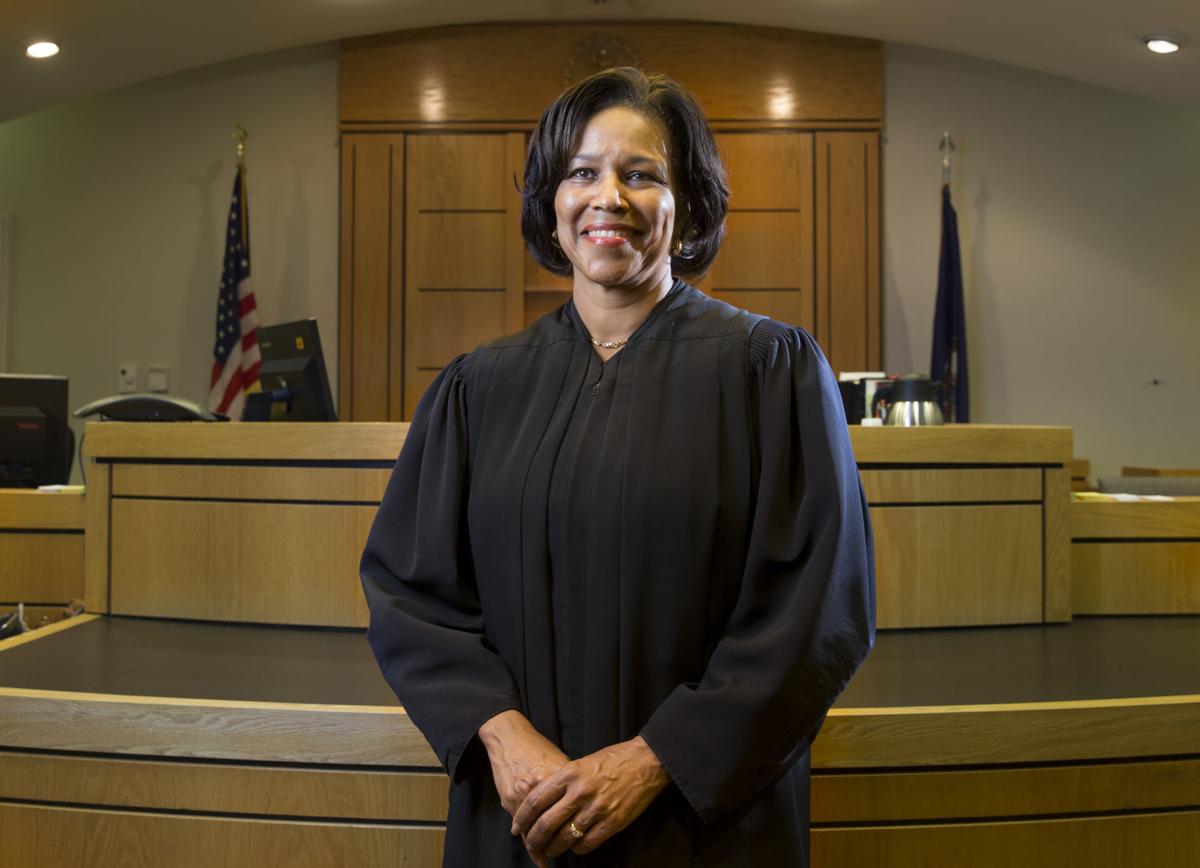

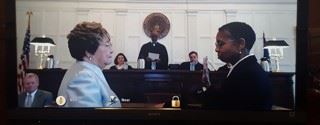
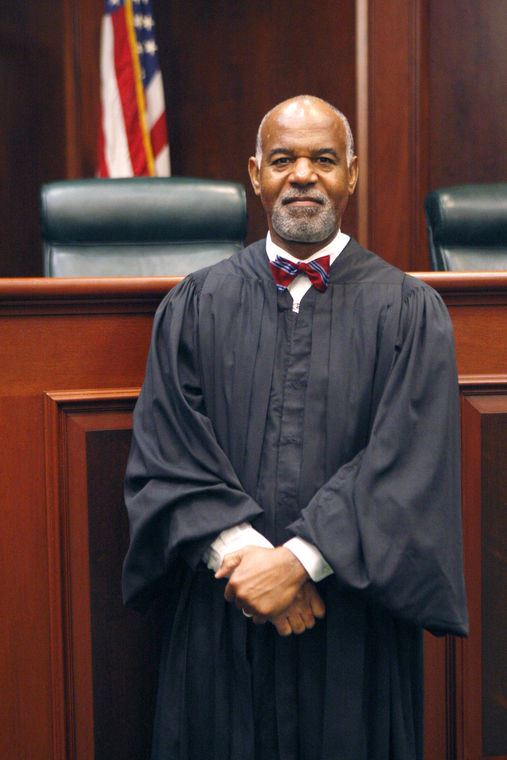 The new chief judge of the Richmond-based 4th U.S. Circuit Court of Appeals is a part-time playwright and actor whose favorite line is as a character in the stage version of “To Kill A Mockingbird.”
The new chief judge of the Richmond-based 4th U.S. Circuit Court of Appeals is a part-time playwright and actor whose favorite line is as a character in the stage version of “To Kill A Mockingbird.”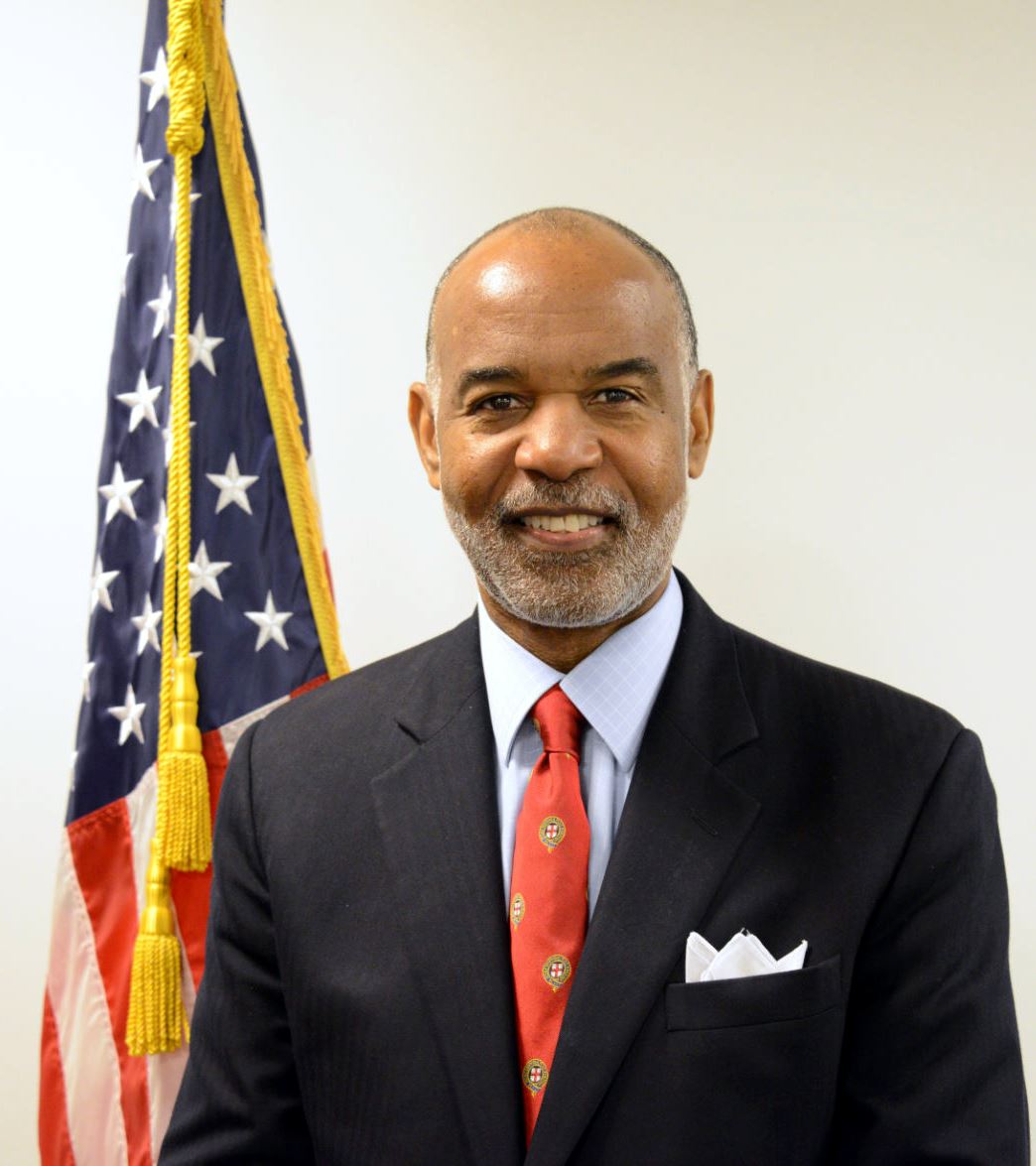 Judge Roger L. Gregory, the former law partner of L. Douglas Wilder, will take over as chief judge of the Richmond-based 4th U.S. Circuit Court of Appeals on Saturday.
Judge Roger L. Gregory, the former law partner of L. Douglas Wilder, will take over as chief judge of the Richmond-based 4th U.S. Circuit Court of Appeals on Saturday.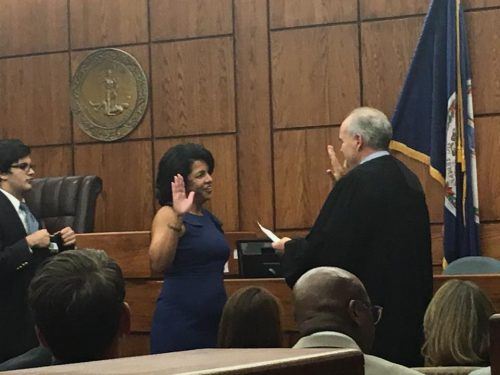 Last week, Prince William County appointed their newest General District Court Judge – Petula Metzler.
Last week, Prince William County appointed their newest General District Court Judge – Petula Metzler.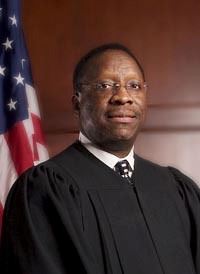
 Donald W. Lemons, Chief Justice of the Supreme Court of Virginia, has been named the recipient of the
Donald W. Lemons, Chief Justice of the Supreme Court of Virginia, has been named the recipient of the 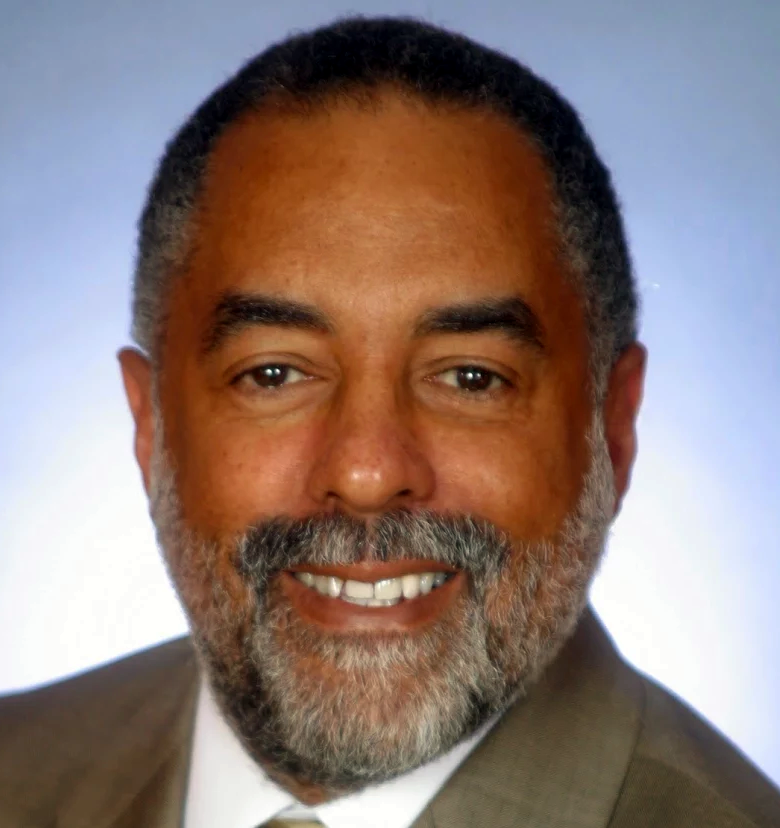 January 2016
January 2016